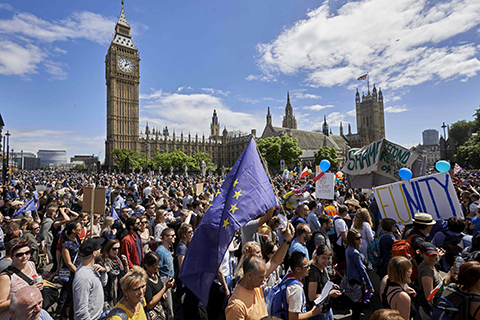 TOPSHOT - Thousands of protesters gather in Parliament Square as they take part in a March for Europe, through the centre of London on July 2, 2016, to protest against Britain's vote to leave the EU, which has plunged the government into political turmoil and left the country deeply polarised. Protesters from a variety of movements march from Park Lane to Parliament Square to show solidarity with those looking to create a more positive, inclusive kinder Britain in Europe. / AFP / Niklas HALLE'N
TOPSHOT - Thousands of protesters gather in Parliament Square as they take part in a March for Europe, through the centre of London on July 2, 2016, to protest against Britain's vote to leave the EU, which has plunged the government into political turmoil and left the country deeply polarised. Protesters from a variety of movements march from Park Lane to Parliament Square to show solidarity with those looking to create a more positive, inclusive kinder Britain in Europe. / AFP / Niklas HALLE'NLONDON: Thousands marched through London yesterday to protest against Britain's vote to leave the EU, which has sparked political turmoil and polarized public opinion. Chanting "We love you EU", waving European flags and carrying colorful banners with slogans like "Breverse", they set off late morning to march towards the Houses of Parliament. "The Leave Campaign Lied", "Save our Future" and "Never Gonna Give EU up," read others, the latter referring to the 1980s hit by Rick Astley. Organizers claimed more than 40,000 were taking part. Police did not immediately give figures.
"I think the Leave campaign misled people, we are (making) a wrong decision because of the lies," protestor Casey, 37, told AFP at the start of the march. "I would like us to reconsider and I don't want to leave the EU."
Seismic Vote
The seismic June 23 vote prompted the resignation of Prime Minister David Cameron - who had backed the failed Remain campaign. It also unleashed a bitter leadership battle in the ruling Conservative party and chaos in the main opposition Labour party, whose leader, Jeremy Corbyn, is now facing all-out revolt. "We can prevent Brexit by refusing to accept the referendum as the final say and take our finger off the self-destruct button," said organizer Keiran MacDermott on the march's Facebook page. "Let's not leave the next generation adrift... Let's march, let's protest, and let's stop Brexit."
Britons, many worried by immigration, voted 52 percent in favor of withdrawing from the EU bloc with 48 percent against. The favorites to succeed Cameron have meanwhile been pushing for a delay in starting the process that will eventually see Britain leave the 28-member EU. Frontrunner Theresa May and high-profile rival Michael Gove have both said they do not expect Article 50 - the formal procedure for leaving the bloc - would be invoked this year.
EU leaders including French President Francois Hollande have urged a swift divorce, fearful of the impact of Britain's uncertain future on economic growth and a potential domino effect in eurosceptic member states. Last week's shock vote plunged financial markets into crisis, wiping trillions off equities around the world and sending the pound to its lowest point in more than three decades against the dollar.
The Bank of England revealed it could slash interest rates this summer to counter the downbeat economic outlook - which it said had "deteriorated" because of Brexit - and potentially re-activate quantitative easing to pump more cash into the economy. In further fallout, finance minister George Osborne warned Friday that the government would abandon its promise to achieve a budget surplus by 2020, sparking forecasts of more austerity spending cutbacks and tax hikes.
'Liars, Liars'
The vote to leave the EU was deeply split. Voters in Scotland, Northern Ireland and the capital London backed remaining, while those that chose to leave were largely from less affluent areas in England and Wales. But there was also a rough generational split. Younger voters were likelier to vote Remain - many of whom worried about their right to travel and work in the EU - while their Baby Boomer elders were likelier to vote Leave.
The narrow victory has triggered anger in Britain among those who wanted to remain in the EU and more than four million people have signed a petition calling for a second referendum. A poll for BBC's Newsnight program found that 16 percent of voters think Britain will stay in the bloc, and 22 percent said they do not know if it will leave. In the coming days, meanwhile, Conservative MPs will whittle down the party leadership candidates to two in a series of votes and the rivals will then tour the country to appeal to some 150,000 party members for their vote.
British media reported yesterday that energy minister and Brexit backer Angela Leadsom has become the favorite to face Theresa May on the ballot paper. Gove, who torpedoed fellow anti-EU campaigner Boris Johnson's leadership hopes on Thursday, cast doubt on whether May could lead the country out of the EU after supporting a "Remain" vote. However, Gove has also faced fierce criticism for turning on his one-time ally Johnson. - AFP










